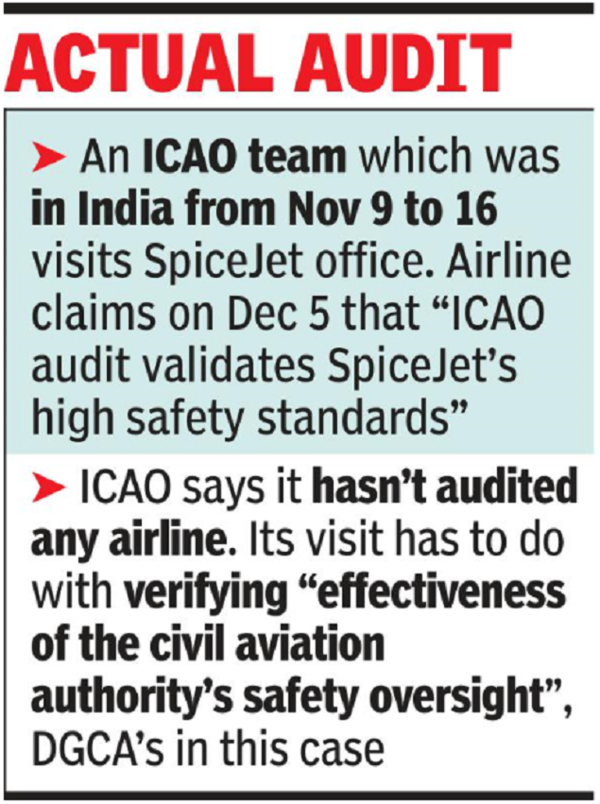Flight of fancy: SpiceJet cooks up audit story – Times of India
The website of ICAO, which is a United Nations specialised agency that sets standards and regulations for civil aviation, states that it never audits any airline or airport in any country.
“As part of an ICAO Coordinated Validation Mission, ICAO teams conduct industry visits to verify the effectiveness of the civil aviation authority’s safety oversight. This will include visits to multiple operators. ICAO wishes to clarify that visits to these operators are not an audit or inspection at all,” it said.

“Operator” in this context refers to SpiceJet, the only airline the ICAO team visited when in India from November 9 to 16. What ICAO did was verify the effectiveness of the DGCA’s safety oversight and in that context, it visited SpiceJet’s office on November 14. “It had nothing whatsoever to do with SpiceJet and its safety standards, however good or bad,” said a senior official, requesting anonymity.
But the press statement issued by SpiceJet on December 5 would have one believe otherwise. “The ICAO audit is the benchmark of safety. We are proud that our safety culture, systems, processes and operations have been found to be in order and at par with the global best practices and safety standards,” said Ajay Singh, chairman and managing director of SpiceJet, in the press statement. “This audit is a testament to the highest standard of safety followed by SpiceJet,” he said. Thereafter, the airline sent a mail to its passengers on Monday, titled, “You are in safe hands. And we aren’t the ones saying it!” SpiceJet added, “ICAO audit validates SpiceJet’s high safety standards.”
SpiceJet did not respond to a query sent by TOI.
In July end, following many technical issues with its aircraft fleet, DGCA had put SpiceJet under “enhanced surveillance” up to September end and thereafter extended it for another month. During this time, SpiceJet was allowed to operate only 50% of its planned flights. It was in the wake of this bad publicity that the ICAO audit of DGCA functioning came about in November, and SpiceJet claimed to have cleared the ICAO audit.
So what does ICAO audit? It audits the aviation safety and aviation security oversight capacities of its member states. In India, it would audit the DGCA’s functioning, for instance. “It is important to recognise that these audits do not cover airlines, airports or other industry operators,” ICAO states on its website.
The senior official said, “ICAO is arguably one of the most misunderstood aviation organisations, and the SpiceJet case has shown how airlines can leverage that to their benefit.” ICAO has been doing its bit to battle this manner of misinformation as well. For instance, on its website, ICAO takes pains to clarify that it is “not an international aviation regulator, just as Interpol is not an international police force”. “We cannot arbitrarily close or restrict a country’s airspace, shut down routes, or condemn airports or airlines for poor safety performance or customer service,” it clarifies. Its website also clarifies it never audits airlines.
The latest ICAO statement said, “ICAO’s Universal Safety Oversight Audit Programme (USOAP) team performed an ICAO Coordinated Validation Mission (ICVM) to India from 9 to 16 November 2022. The objective of an ICVM is to validate progress in addressing the findings from previous USOAP activities.”
For all the latest business News Click Here

